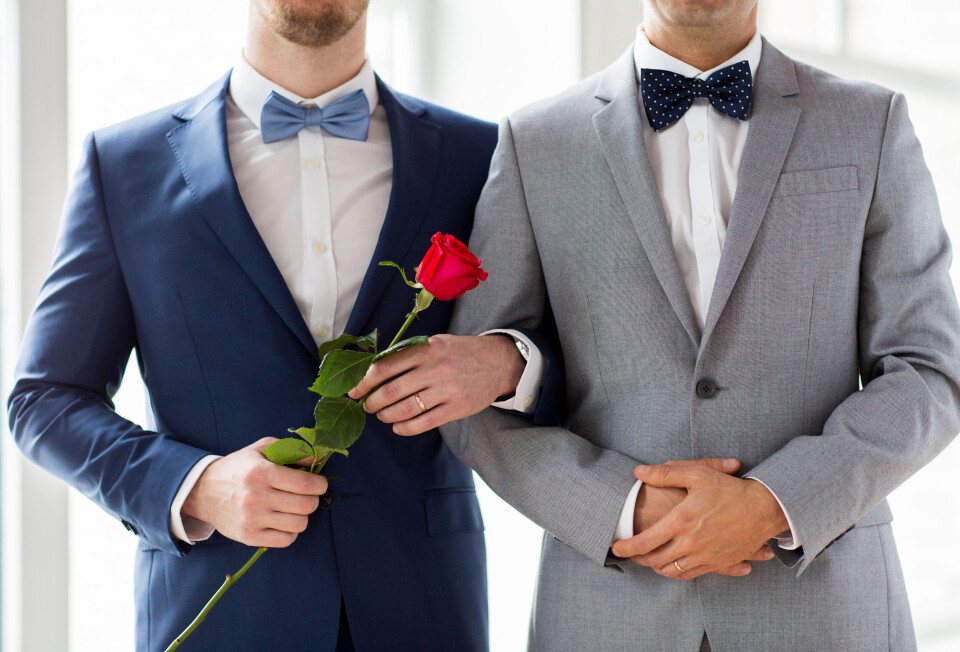-
France public transport fares should double, claims report to Transport Ministry
French passenger fares currently cover less than a fifth of the total service cost
-
Processionary caterpillars return across France, warn local authorities
Insect has been seen two months earlier than usual in many areas
-
EES: Why am I fingerprinted every time at Nice airport?
Phase-in period is continuing and technical improvements are still awaited
Homophobia still high a decade since France allowed same-sex marriage
More than 70,000 same-sex couples have tied the knot since 2013. But campaigners say violence against the LGBT community remains high

It is a decade since French MPs approved a bill that paved the way for same-sex marriage to be legalised in France.
More than 70,000 same-sex couples have tied the knot since the law cleared parliament on April 23, 2013.
The legislation was hugely controversial. Dubbed mariage pour tous, or marriage for everyone, it sparked a long, acrimonious debate and saw hundreds of thousands hit the streets in opposition.
Among those opposing same-sex marriage was France’s current interior minister, Gérald Darmanin. Back in 2013, he was an MP from the right-wing Les Républicains party and called it a “damaging project”.
He admitted on Friday (April 21) that he had been wrong and outlined government plans to tackle homophobia.
But how common is Darmanin’s change of opinion? Has a decade of same-sex marriage improved or worsened homophobia?
‘Great step in social progress’
“It gave access and equality of rights for homosexuals,” said Lucile Jomat, the president of SOS Homophobie, one of France’s main LGBT rights associations. “It remains a great step up in social progress.”
She said the benefits of the law were that it gave greater visibility to the LGBT community and helped to make France more inclusive.
People have opened up about their sexuality, feel more comfortable with displaying it in public and youngsters are quicker to denounce homophobia, she added, highlighting other positives of the legislation.
Ms Jomat said mariage pour tous was also the milestone that triggered other advancements, such as the law on medically assisted reproduction - or procréation médicalement assistée (PMA) - that was enacted on August 2, 2021, and allowed same-sex couples to have a child.
Read also: Can same-sex couples get a church blessing in France?
Level of homophobia ‘remains high’
However, Ms Jomat said the level of violence against homosexuals and transgender people remained high in every sphere: from homes to schools, online, at work and in public spaces.
“Family remains an environment that is unsafe,” she said, adding that SOS Homophobie was particularly concerned at the high rate of young people who contacted the association with problems.
SOS Homophobie recorded 1,515 cases of homophobia in 2021, the latest year that the association has figures for. While the number is one of the lowest since the same-sex marriage law was passed, it remains higher than during the 1994 to 2010 period.
The number of cases hit an all-time high - 3,517- in 2013 when the law was being debated and the issue was in the spotlight.
Ms Jomat said it is a similar situation for transgender people now - the intensification of coverage increases the amount of abuse.
‘French society is divided’
Unlike Mr Darmanin, not all politicians have switched stances on same-sex marriage.
Thierry Mariani, Gilbert Collard or Laurent Wauquiez- among the most visible politicians against mariage pour tous back in 2013 - are still adamantly against.
Mr Wauquiez, in particular, said he would revoke it. He hopes to become the new face of the French right and is rumoured to have presidential ambitions for 2027.
He also appears more and more in interviews with conservative, far-right and Catholic-oriented newspapers and radio shows, aware that the rebuke of same-sex marriage is still a core component of right-wing voters.
Les Républicains chose François Fillon as its candidate for the 2017 presidential election, against the predictions of pundits and polls who had forecast a large win for opponent Alain Juppé.
Fillon had vowed to rewrite the mariage pour tous law if his party got back into power, earning him support from the Catholic right.
“I see a part of the French population that is very inclusive and an opposition that discriminates and reduces access to rights,” Ms Jomat told The Connexion on Friday (April 21)
“The divide is the image of French society where people no longer communicate between each other.”
Related articles
France Qatar 2022: Minister sends LGBTQ+ message with rainbow jumper
























